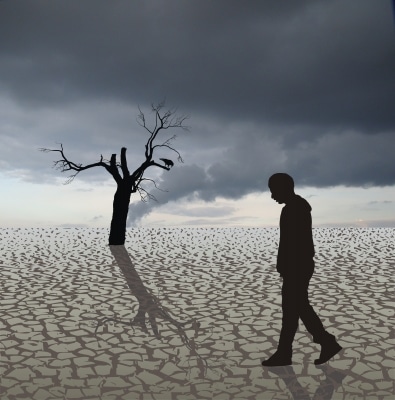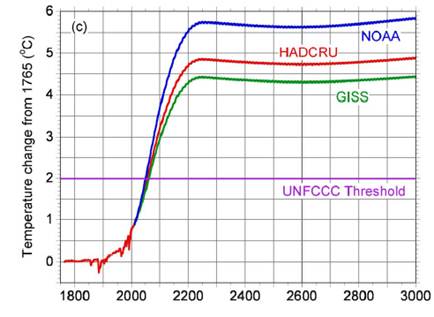This a guest post by Professor Stephan Lewandowsky, of the University of Western Australia.
THE guy next to you in the pub turns around and says, “Popcorn doesn’t exist”… and he adds, “but it grows naturally on trees! And it’s good for you!”
Popcorn doesn’t exist but grows naturally on trees and is good for you? Would you entrust that fellow with the lives of your children if their future depended on logical coherence? No. No one would place any confidence in such incoherence.
Sadly, the public in some countries – in particular in Australia and the U.S. – is drenched in such incoherence in the form of climate denial. This incoherence often goes undetected.
To see why, it is helpful to analyze those messages from purported “skeptics” in some detail. For example, earlier this week on the same day that Australia’s only national broadsheet, the Rupert Murdoch-owned The Australian, received an adjudication by the Press Council against them for likening wind energy to pedophilia – yes, they really did say that – the paper also ran a piece that proclaimed future global warming to be minimal and beneficial to the planet.
Yes they really did say that, by dutifully reprinting a piece that ran in the Murdoch-owned Wall Street Journal the day before. Is there any truth to this comforting news?
No. To see why, it is helpful to survey the three major strands of climate denial.
The first strand is to deny the fact that the globe is warming. This strand waxes and wanes, and its prominence may well depend on local conditions. No point in making a preposterous claim about the planet cooling in Houston, for example, when Texas is suffering from an exceptional heat wave.
But when Australia or the United Kingdom is cool, relative to the remainder of the globe, then that old canard of warming having stopped can be temporarily sold to the public in those places—because people primarily rely on their own personal experiences, rather than scientific data, when judging the truthfulness of statements about the climate.
This very human tendency to rely on personal experiences makes it easy for deniers to sprout falsehoods by choosing a time and place where their release might be effective.
In actual fact, by the way, the oceans are accumulating energy at the rate of the equivalent of 3-5 hiroshima bombs per second. No, that is not a misprint, it is around 240 trillion watts per second, which is equivalent to around 3-5 nuclear bombs. Every second of every minute of every hour of every day.
As the evidence for warming has become incontrovertible, denial has shifted to its next strand—no point in denying the existence of popcorn if everyone can see the kernels. This strand acknowledges the warming but puts it down to “natural fluctuation.”
Huzzah! The popcorn that a moment ago didn’t exist is now all natural. Never mind that the “natural fluctuations” of past climates expressed themselves over time scales measured in the thousands and millions of years, not the few decades during which temperatures have rapidly risen since the 1970s. And never mind that we’ve known about the thermal properties of greenhouse gases since the middle of the 19th century, and never mind that the next IPCC report will likely be virtually certain that the warming is caused by human activities.
In light of all this evidence, enter the third strand of denial. It acknowledges that warming exists, and that humans cause it, but that it’s going to be minimal and beneficial.
Huzzah! The non-existent popcorn that became all natural is now produced by humans and, hey, it’s good for you. Have a handful more, mate, because popcorn makers are people too and they want their profits to increase.
When considered together, the incoherence of denial is obvious. But by judicious timing of those messages, deniers can exploit the human tendency to focus on personal experience and on each statement in isolation.
Aided by irresponsible or ill-informed media outlets, our human cognitive limitations enable such incoherent denial to find public traction.
But setting aside the incoherence of denial, what about this latest claim in The Wall Street Journal, rehashed in The Australian, that warming may exist and may be human caused, but that it’s actually good for us? That claim is coherent and so it could be true, couldn’t it? Yes, it could be, but it isn’t.
It isn’t true because the claim rests on a misrepresentation of the implications of the one peer-reviewed study it cites, by Ring and colleagues.
When I contacted one of the authors, Professor Michael Schlesinger of the University of Illinois, he replied “The author of the Wall Street Journal article that mentions the findings of our paper is just plain wrong about future warming. Our research shows that global warming will exceed 2°C, defined as dangerous climate change, by the middle of this century.”
To illustrate, Professor Schlesinger provided this figure from one of his recent papers:
Now here is the question that should be of greatest interest to all true skeptics: How does this graph get translated into “minimal warming that is beneficial for us” in the opinion pages of the Wall Street Journal and its little antipodean appendage? The answer is not “skepticism.”
It’s denial.
Denial to distract from the fact that the recently-leaked IPCC draft report concluded that it is now virtually certain that warming is caused by human activities.
Virtually certain means 99% certainty – that’s up from 90% in the previous report. As the science gets more and more incontrovertible, denial becomes more and more desperate.
Image courtesy of Vlado / FreeDigitalPhotos.net
Subscribe to our newsletter
Stay up to date with DeSmog news and alerts







